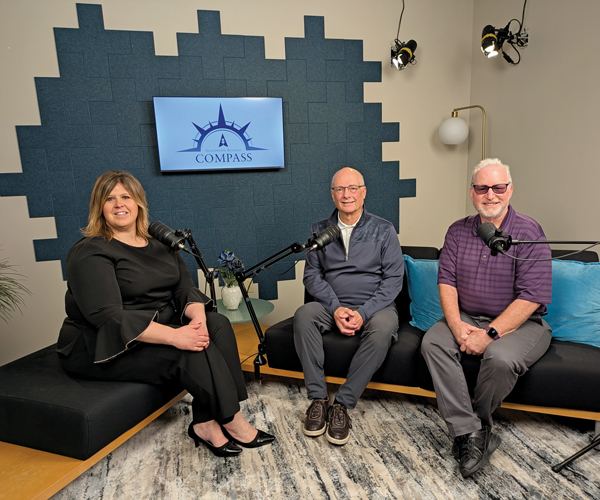As Restaurateur Malisse Sinito was preparing to open her landmark restaurant, the Marble Room, a friend told her about an opportunity through Baldwin Wallace University that would help spread the word about the hot spot’s fast-approaching launch.
Sinito, who is also a BW graduate, connected with a team from the university’s Digital Marketing Clinic, a student-driven program that helps local businesses with the latest technology and tools for websites, social media and more. Through the program, a team created a detailed social media plan for the September 2017 roll out of the new high-end eatery located in the former National City Bank space of the historic Garfield Building,
“I always keep in touch with Baldwin Wallace,” says Sinito. “The Digital Marketing Clinic sent me a group of great students — all seniors. They analyzed the market for me and my competition and put together a step-by-step program.”
Like many small business owners, Sinito did not have much time — nor the expertise — for digital marketing while balancing all the other demands of her business. As president of the Millennia Hospitality Group, she also runs Il Venetian in Key Tower, Lockkeepers in Independence and the St. Clair Ballroom, a special event downtown venue. The group also runs Marble Room Sushi and Il Venetian Doughnuts and Gelato, both in the Key Tower lobby.
The digital marketing team executed a plan for her and educated her on how to continue rolling it out in the future.
“They set me on my journey and educated me,” she explains. “It’s hard to make the time! This was so helpful, especially for a busy person.”
Lack of time is one of the major challenges DMC director and BW Professor Tim Marshall aims to address through the program.
“We recognize that small business people don’t always have a lot of time for this,” he says.
Marshall says DMC clients are typically businesses, nonprofits, sole owners or family businesses who are looking to create a strategy from scratch or rethink how they are using digital marketing.
The student teams set up realistic plans that clients can maintain after the projects are over. Part of the service is to train the in-house staff who will be responsible for executing the strategy moving forward.
It is not unusual to see BW students around Greater Cleveland’s corporations, hospitals and nonprofits. One reason is the university’s experiential learning requirement, which mandates 30 hours of outside activities like internships, undergraduate research, service-learning or study abroad.
“We have close proximity to downtown but also close relationships with the major corporate headquarters and other companies because they all have BW graduates,” says Marshall.
Clients of the Digital Marketing Clinic pay a competitive fee for the service, which varies based on the scope of the project, and students receive a stipend for their work.
“The goal is to build a ‘super team’ for each client,” says Marshall.
Most students in the Digital Marketing Clinic are also carrying a full course load while serving on the team. Many work at additional internships at the same time. Digital marketing has become such an integral part of today’s world that BW’s School of Business will start offering a digital marketing major in the fall of 2019.
“Our students are immersed in the community,” says Marshall, “and exposed to the real world.”
In addition to being more effective and less expensive than traditional marketing approaches, one of the things Marshall likes most about digital marketing is that it is always evolving.
“Sometimes something will change in the beginning of a semester, and I have to reteach it at the end of the semester,” he says. “I love when that happens because it shows students how fast this can evolve and how you have to be flexible.”
Marshall shared a recent case study on the importance of flexibility. Last November, the advertising management platform on Facebook went down the Tuesday before Thanksgiving, just as advertisers prepared for their biggest shopping days of the year.
“These social media business tools are run by third parties that you have no control over,” he explains. “The more exposure these students have to this, the better,” he adds.
Marshall also offered some advice for business owners embarking on a social media effort. In contrast to his high-tech teachings, he cites a tradition marketing rule as number one.
“Know your audience,” he explains. “Post what is important to them and provide quality useful content.”
Marshall cautions that this is still one of the most common disconnects in many direct marketing efforts.
Another area Marshall emphasizes is measuring results, which can be one of the most valuable aspects of digital marketing, but also one of the most challenging.
“Analytics can often give you more data than you need or measures things that don’t matter to you,” he says.
That’s why he says it’s important to set strategic goals and define what success will look like.
“This will take you back to your business goals … so you can go from analytics to action,” he adds.
So, how is restaurant-owner Sinito keeping up with her digital marketing a little over one year after the Marble Room opening?
The restaurant continues to successfully reach customers through Facebook, Instagram and OpenTable, as well as its website.
“They gave me examples of good posts and bad posts,” she says. “We are always looking for things that are worthy to post.”




